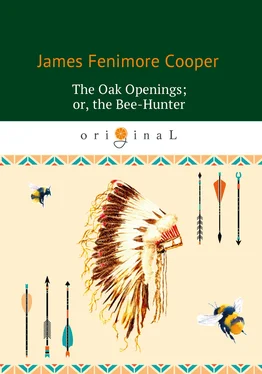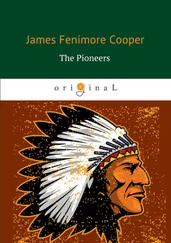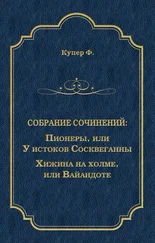The great advantage that the party of the bee-hunter had now obtained must be very apparent to all. In possession of ALL the canoes, their enemies were, or would be for some time at least, confined to the northern side of the river, which was so wide near its mouth as to present an effectual barrier between them and those who occupied the opposite bank. The canoes, also, enabled the weaker party to change their position at will, carrying with them as many effects as were on board, and which included the whole of the property of le Bourdon; while their loss deprived their enemies of all extra means of motion, and would be very likely to induce them to proceed on their expedition by land. The objects of that expedition could only be conjectured by the bee-hunter, until he had questioned the Chippewa; a thing he did not fail to do, so soon as he believed the party quite safe under the south shore. Here the fugitives landed, proceeding up a natural channel in the wild rice in order to do so, and selecting a bit of dry beach for their purpose. Margery set about lighting a fire, in order to keep the mosquitos at a distance, selecting a spot to kindle it, behind a swell on the land, that concealed the light from all on the other shore. In the morning, it would be necessary to extinguish that fire, lest its smoke should betray their position. It was while these things were in progress, and after le Bourdon had himself procured the fuel necessary to feed pretty Margery’s fire, that he questioned the Chippewa touching his captivity.
“Yes, tell all ‘bout him,” answered the Indian, as soon as interrogated – “no good to hide trail from friend. ‘Member when say good-by up in openin’ to Bourdon?”
“Certainly – I remember the very instant when you left me. The Pottawattamie went on one path, and you went on another. I was glad of that, as you seemed to think he was not your friend.”
“Yes; good not to travel on same path as inimy, ‘cause he quarrel sometime,” coolly returned the Indian. “Dis time, path come together, somehow; and Pottawattamie lose he scalp.”
“I am aware of all that, Pigeonswing, and wish it had not been so. I found the body of Elksfoot sitting up against a tree soon after you left me, and knew by whose hands he had fallen.”
“Didn’t find scalp, eh?”
“No, the scalp had been taken; though I accounted that but for little, since the man’s life was gone. There is little gained by carrying on war in this manner, making the woods, and the openings, and the prairies, alike unsafe. You see, to what distress this family is reduced by your Injin manner of making war.”
“How you make him, den – want, to hear. Go kiss, and give venison to inimy, or go get his scalp, eh? Which bess fashion to make him afeard, and own you master?”
“All that may be done without killing single travellers, or murdering women and children. The peace will be made none the sooner between England and America, because you have got the scalp of Elksfoot.”
“No haben’t got him any longer; wish had – Pottawattamie take him away, and say he bury him. Well, let him hide him in a hole deep as white man’s well, can’t hide Pigeonswing honor dere, too. Dat is safe as notch cut on stick can make him!”
This notch on a stick was the Indian mode of gazetting a warrior; and a certain number of these notches was pretty certain to procure for him a sort of savage brevet, which answered his purpose quite as well as the modern mode of brevetting at Washington answers our purpose. Neither brings any pay, we believe, nor any command, except in such cases as rarely occur, and then only to the advantage of government. There are varieties in honor, as in any other human interest: so are there many moral degrees in warfare. Thus, the very individual who admires the occupation of Algiers, or that of Tahiti, or the attack on Canton, together with the long train of Indian events which have dyed the peninsulas of the East in the blood of their people, sees an alarming enormity in the knocking down of the walls of Vera Cruz, though the breach opened a direct road into San Juan de Ulloa. In the eyes of the same profound moralists, the garitas of Mexico ought to have been respected, as so many doors opening into the boudoirs of the beautiful dames of that fine capital; it being a monstrous thing to fire a shot into the streets of a town, no matter how many came out of them. We are happy, therefore, to have it in our power to add these touches of philosophy that came from Pigeonswing to those of the sages of the old world, by way of completing a code of international morals on this interesting subject, in which the student shall be at a loss to say which he most admires – that which comes from the schools, or that which comes direct from the wilderness.
“So best,” answered the bee-hunter. “I wish I could persuade you to throw away that disgusting thing at your belt. Remember, Chippewa, you are now among Christians, and ought to do as Christians wish.”
“What Christians DO, eh?” returned the Indian, with a sneer, “get drunk like Whiskey Centre, dere? Cheat poor red man; den get down on knee and look up at Manitou? DAT what Christian do, eh?”
“They who do such things are Christian but in name – you must think better of such as are Christians in fact.”
“Ebberybody call himself Christian, tell you – all pale-face Christian, dey say. Now, listen to Chippewa. Once talk long talk wit’ missionary – tell all about Christian – what Christian do – what Christian say – how he eat, how he sleep, HOW he drink! – all good – wish Pigeonwing Christian – den ‘member so’ger at garrison – no eat, no sleep, no drink Christian fashion – do ebbery t’ing so’ger fashion – swear, fight, cheat, get drunk – wuss dan Injin – dat Christian, eh?”
“No, that is not acting like a Christian; and I fear very few of us who call ourselves by that name, act as if we were Christians, in truth,” said le Bourdon, conscious of the justice of the Chippewa’s accusation.
“Just dat – now, I get him – ask missionary, one day, where all Christian go to, so dat Injin can’t find him – none in woods – none on prairie – none in garrison – none in Mack’naw – none at Detroit – where all go to, den, so Injin can’t find him, on’y in missionary talk?”
“I am curious to know what answer your missionary made to that question.”
“Well, tell you – say, on’y one in ten t’ousant RAAL Christians ‘mong pale-face, dough all call himself Christian! DAT what Injin t’ink queer, eh?”
“It is not easy to make a red man understand all the ways of the pale-faces, Pigeonswing; but we will talk of these things another time, when we are more at our ease. Just now, I wish to learn all I can of the manner in which you fell into the hands of the Pottawattamies.”
“Dat plain ‘nough – wish Christian talk half as plain. You see, Bourdon, dat Elksfoot on scout, when we meet in openin’, up river. I know’d his ar’nd, and so took scalp. Dem Pottawattamie his friend – when dey come to meet ole chief, no find him; but find Pigeonwing; got me when tired and ‘sleep; got Elkfoot scalp wid me – sorry for dat – know scalp by scalplock, which had gray hair, and some mark. So put me in canoe, and meant to take Chippewa to Chicago to torture him – but too much wind. So, when meet friend in t’odder canoe, come back here to wait little while.”
This was the simple explanation of the manner in which Pigeonswing had fallen into the hands of his enemies. It would seem that Elksfoot had come in a canoe from the mouth of the St. Joseph’s to a point about half-way between that river and the mouth of the Kalamazoo, and there landed. What the object of the party was, does not exactly appear, though it is far from being certain that it was not to seize the bee-hunter, and confiscate his effects. Although le Bourdon was personally a stranger to Elksfoot, news flies through the wilderness in an extraordinary manner; and it was not at all unlikely that the fact of a white American’s being in the openings should soon spread, along with the tidings that the hatchet was dug up, and that a party should go out in quest of his scalp and the plunder. It would seem that the savage tact of the Chippewa detected that in the manner of the Pottawattamie chief, which assured him the intentions of the old warrior were not amicable; and that he took the very summary process which has been related, not only to secure HIS scalp, but effectually to put it out of his power to do any mischief to one who was an ally, and by means of recent confidence, now a friend. All this the Indian explained to his companion, in his usual clipped English, but with a clearness sufficient to make it perfectly intelligible to his listener. The bee-hunter listened with the most profound attention, for he was fully aware of the importance of comprehending all the hazards of his own situation.
Читать дальше












